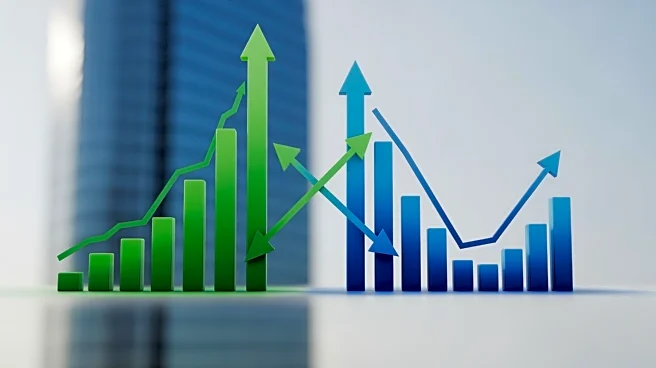What's Happening?
A recent survey conducted by JPMorgan has highlighted a significant disparity in economic confidence between high-income and low-income earners in the United States. According to the survey, higher-income consumers are more optimistic about their financial
outlook, with nearly six out of ten reporting that covering monthly bills has become easier compared to six to twelve months ago. In contrast, only 37% of middle-income and 30% of lower-income groups expressed similar sentiments. The survey also revealed that high-income respondents are more likely to plan increased spending on non-essential items over the next year. This divergence in economic experiences is described as a 'K-shape,' indicating that well-off Americans continue to spend while lower earners face inflationary pressures.
Why It's Important?
The findings from JPMorgan's survey underscore the growing economic divide in the U.S., which has significant implications for consumer spending and economic policy. As higher-income individuals express greater confidence and willingness to spend, they contribute to economic growth and stability. However, the struggles faced by lower-income groups could lead to reduced consumer spending, impacting businesses that rely on this demographic. This disparity may also influence public policy decisions, as lawmakers consider measures to address inflation and support lower-income households. The economic divide could exacerbate social inequalities and affect political dynamics, as different income groups experience varying levels of financial security.
What's Next?
The survey results may prompt policymakers to consider targeted interventions to support lower-income households, potentially through tax relief or direct financial assistance. Businesses catering to lower-income consumers might need to adjust their strategies to accommodate reduced spending power. Additionally, the ongoing economic divide could influence upcoming political debates and elections, as candidates address the concerns of different income groups. Stakeholders in the financial sector may also monitor these trends closely to anticipate shifts in consumer behavior and adjust their forecasts accordingly.
Beyond the Headlines
The economic confidence disparity highlighted by JPMorgan's survey raises ethical questions about income inequality and its impact on social cohesion. As the gap between high and low-income earners widens, there may be increased calls for systemic changes to address the root causes of inequality. This could involve discussions around wage policies, access to education, and healthcare affordability. The long-term implications of this divide could lead to shifts in cultural attitudes towards wealth and consumption, potentially influencing future generations' perspectives on economic success and social responsibility.
















